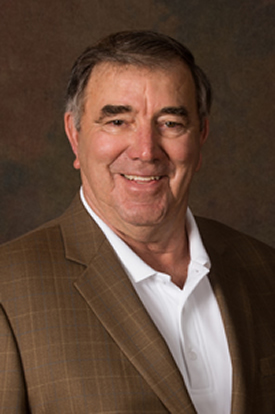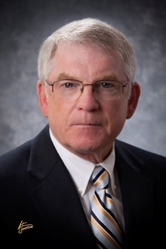

After holding just two joint meetings with the Bainbridge City Council, Decatur County Commissioners have dropped out in response to city officials accusing the county government of “double taxation” of Bainbridge citizens.
In a letter to Bainbridge Mayor Edward Reynolds, County Board of Commissioners Chairman Frank Loeffler wrote, “Because of the consistent issues brought against Decatur County by the City, it is contradictory in nature that we would continue to participate in the joint meetings, which were established for open dialog.”
The first of what was to be regular quarterly joint meetings between the two local governments was held on April 29, after a period of public disagreement between city and county officials. County officials had made open records requests to the City of Bainbridge that led to the public becoming aware of a situation involving City Manager Chris Hobby having been delinquent on his household’s city utility bills.
Some city officials judged the county’s actions as a personal attack on Hobby, while county officials were up in arms over the bidding process that led to the City of Bainbridge’s decision to take the city’s garbage to Campbellton, Fla., rather than the Decatur County Landfill, thus reducing county revenue.
Bainbridge State College President Dr. Richard Carvajal served as the mediator of the first meeting and discussed how he hoped the joint meetings would allow the two governments’ officials to discuss issues of mutual concern more directly.
The second joint meeting was held in July without a mediator. Rick McCaskill, executive director of the Decatur County Industrial Development Authority, gave a detailed update on the status of new business prospects and possible business expansion. While questions were asked to McCaskill, there was no dialogue between the two governments’ elected officials.
The third meeting was to be held around November or December, however, for now it appears that won’t happen.
View Copy of Loeffler’s letter to Bainbridge Mayor Edward Reynolds dated 08/20/14
Loeffler referred to the Bainbridge City Council’s meeting on August 5 as the precipitating incident behind county commissioners dropping out of the joint meetings. At that meeting, Attorney Buddy Welch of McDonough, Ga., and a colleague, Michael Brown, made a brief presentation outlining 10 areas in which the attorneys believe city residents are either being charged twice for county services or pay for services that they don’t receive.
Welch and Brown were hired sometime in 2013 by city officials to research concerning the two governments’ joint service delivery agreement, which spells out what services each party is responsible for providing. According to county officials, in Fall 2013, the City of Bainbridge made numerous Open Records Requests of county records, including detailed department-by-department budgets. That information was forwarded to the attorneys at city officials’ requests.

Also on August 5, the Bainbridge City Council voted 5-1 to form a committee to give a full report to county commissioners concerning the areas of “inequity” outlined by Welch. The committee consists of Mayor Reynolds, City Manager Hobby, Attorneys Welch and Brown and Bainbridge attorney David Kendrick, who previously advised the City of Bainbridge on its debated SPLOST negotiations with Decatur County.
Councilwoman Roslyn Palmer voted against giving the committee authority, saying she would prefer to wait until after 3 new county commissioners take office in January 2015 to present that report. Palmer said she would prefer that the City Council and county commissioners meet together again before bringing in an attorney and mediator to present the findings.
However, Mayor Reynolds disagreed, saying he believed city officials shouldn’t have to wait to defer to new county commissioners to present the findings.
“My proposal is that [the meetings] be more of an educational process, where we give them the documents and let them review them,” Attorney Welch said. “Having a mediator there, I’ve found, helps calm tempers and avoid shouting. Court systems are pushing the use of mediators.”
In reference to the City Council voting to raise the city’s millage rate by two mills, Councilwoman Glennie Bench said city officials “can’t stand by and allow citizens to be taxed for services not received.”
According to Welch, tax payers within Bainbridge city limits pay approximately 40 percent of Decatur County Commissioners’ property tax receipts, but in his view, there is no “remuneration” for services provided by City of Bainbridge that residents of unincorporated Decatur County enjoy, such as recreation and maintenance of city roads.
remuneration – to pay, recompense, or reward for work, trouble, etc.
Welch continued:
“We do have recommendations that we enter into intergovernmental agreements that we think will save a significant amount of money for all the taxpayers of this county, including animal control agreement, code enforcement/planning/zoning, police service, fire service and recreation. We think they need to be handled by way of contracts.”
“What we are asking the mayor and council to do is allow staff to go ahead and finish up their comments of what we proposed to present to the county commissioners as to what we contend is an equitable method by which we resolve service delivery strategy issues and any inequities that exist.”
“It’s our estimate … that when you get tax equity, that doesn’t necessarily mean that the county going to write you a check so that have more money. What it really means is, is that the taxpayers within the city will not be paying for services they don’t receive, so they should see a rollback or reduction in their county property tax. We think it’s in excess of two mills.”
After answering questions from Councilwoman Bench, Welch clarified what the effect of the service delivery agreement negotiations might be.
“You need to understand, this doesn’t have to be a slam dunk that is going to happen by Jan. 1, 2015. It can be done piecemeal, brought in over a period of time so that you balance it out over a period of time. There’s a lot of ways that you can settle things, there’s a lot of ways that you can resolve things, if people want to resolve it.”
However, Welch’s presentation is apparently looked upon negatively by Decatur County officials. In his letter, Loeffler wrote that the City of Bainbridge’s intentions were confrontational in nature.
“This action has misled and confused county officials. The maneuvering by the City Council is an unnecessary expense for city residents.”




Be the first to comment